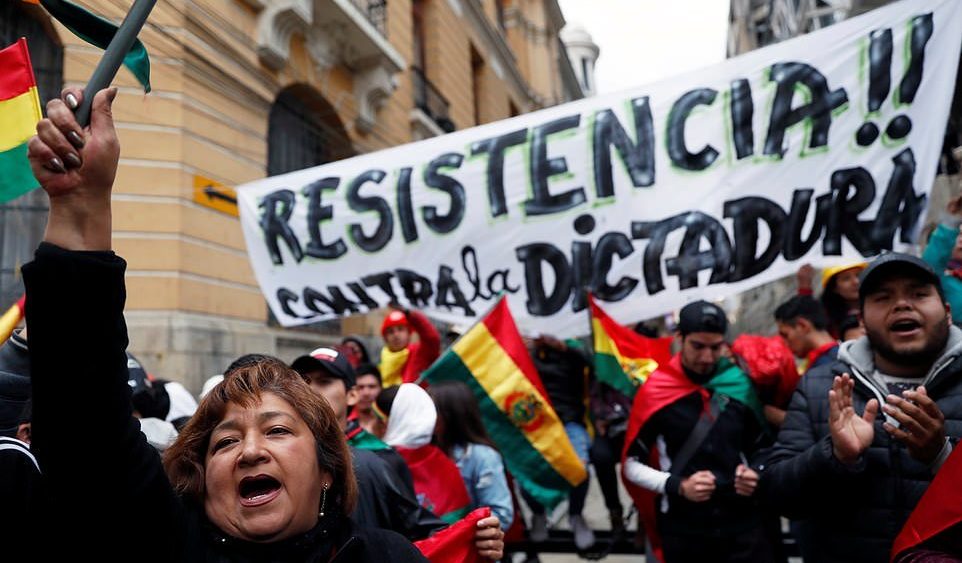“The temporary death of democracy in Chile will be regrettable, but the blame lies clearly with Dr. Allende… Pinochet & his fellow officers are one’s pawns. Their coup was homegrown, and attempts to make out that the Americans were involved are absurd”
– The Economist, 9/15/73*
Together we can argue about referendums, (and hopefully surpass the precedent set by the British).
We can discuss longevity of heads of state; and whether a politician like Evo Morales in Bolivia, the late Hugo Chavez in Venezuela, or for that matter, German chancellor Angela Merkel— still manoeuvring Germany after abdicating the party leadership — should have had an extended career in office for more than a decade, based on electoral popularity alone.
But when military interventionism deposes the president elect of a nation, we forcefully decry the coup.
Bolivian armed forces, guided by their old contempt for democracy, have thwarted all constitutional mechanisms. Leading civilian opposition figureheads do not resemble the Indigenous Left which long criticised Evo. Opposition leader Fernando Camacho sooner resonates with the vehement Evangelical revival in the region’s politics.
With an equal belief in the Bible and the gun Camacho declared “Begone from Bolivia, Satan! Jesus governs now” Fellow exorcist, Senator-turned-President Jeanine Áñez promised to free the institutions of government from ”Satanic indigenous rituals”. Hastily, Germany announced it welcomes the improved democratic situation in the landlocked Andean country; Federica Mogherini stated the EU’s wishes for peace and quiet until new elections. Immediately, Washington recognised legitimate members of the same Church where Evangelicals Mike Pence and Jair Bolsonaro (baptised on River Jordan) worship.
Exiled in Mexico, Morales has meanwhile made headlines with gestures nearly as flashy: such as by driving a Bolivian-made ”Quantum” electric car around Mexico City. Before the coup, a more diverse opposition in Potosí targeted the MAS (Movement Towards Socialism) government’s attempts at founding a joint-owned factory for producing lithium battery cells for export to Europe.
Ousting Morales resonates as a gunshot fired into the air by armed forces, deterring neighbouring countries against too much euphoria towards their Latin American “New Deal” hopes.
The coup represents a threatening example in the region. It comes as warning to the people of Argentina after they massively voted against the neoliberal IMF agenda of Mauricio Macri ; and to the Brazilians rejoicing Lula’s liberation from being a political prisoner.
The humiliation of Morales’ Movimiento Al Socialismo (MAS) times with neighbouring Chilean youth’s eruption into burgeoning political consciousness, as demonstrations defied rubber bullets of the right-wing Neo-Pinochetist Piñera regime.
Leaked recordings reveal the voices of Bolivian opposition teams, endorsed by the military, boasting of their direct interrelationships with US Republican senators Ted Cruz and Marco Rubio: both descendants of Cuban exiles, representing the States of Texas and Florida respectively, they ardently support the Neo-Conservative agenda set by the US bipartisan elite. Senator Cruz campaigned for his party’s nomination by promising to ”bomb Iraq until it glows in the dark”. Marco Rubio makes his sentiments clear twitter-casting pictures of Muamar Ghaddafi’s executed head.
Senators Rubio and Cruz of the GOP mainstream may differ from Trump on one matter of realpolitik: slowly, they capitulate in their resistance to the future of Green Industry. Green Industry looms upon the capitalist horizon. Lithium will motorise the future’s highways. Has Bolivia’s hoarding the world’s largest lithium reserves (more reserves sprawl throughout Peru, Argentina and Chile) tempted the realists in the Neo-Conservative establishment?
Is the coup merely an attempt to prevent the exploitation of lithium at the service of Big Petroleum? Neo-Cons now struggling to control the Andean reserves may have accepted the Lithium-powered future of automotive industry, and are now applying old ways.
Rising social movements in Latin America form part of a nascent Progressive International. They represent “Neo-Keynesian” New Deal economic ideals of redistribution of wealth across national and class barriers. Andean countries like Bolivia, Peru and Argentina have the most lithium needed for Green Industry.
That makes our countries pivotal to the world’s future: either a borderless, internationalist Green New Deal uplifting and employing majorities; or a neo-colonial version of Green Industry, the farce we had hoped to avoid: plundering Bolivia for its lithium so that the foremost polluting countries can amend their participation in planetary heating at the expense of the inhabitants of the “Third World” today politely renamed ”Global South”. NO TO THE PROSPECT OF “GREEN” NEOCONSERVATISM!
Meanwhile, Morales’ old struggle against Bechtel‘s privatisation of Bolivian water 20 odd years earlier remains a prescient example for European countries like Serbia, where protestors today resist the privatisation of water.
*Quote from The Economist courtesy of the blog of American Journalist Jeffrey St Clair
Arturo Desimone is an Aruban-Argentinean writer and visual artist, currently based between Argentina and the Netherlands (www.arturoblogito.wordpress.com). He’s also member of the Thematic DSC Peace and International Policy 1.
Photo (c) Reuters
Do you want to be informed of DiEM25's actions? Sign up here















